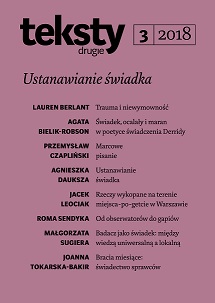Bystander, czyli kto? Potoczne wyobrażenia Polaków na temat stosunku do Żydów w czasie okupacji hitlerowskiej
Bystanders – Who Are They? Poles’ Current Perceptions of Attitudes Towards Jews During the Nazi Occupation
Author(s): Michał Bilewicz, Maria BabińskaSubject(s): Ethics / Practical Philosophy, Social Philosophy, Social history, Fascism, Nazism and WW II, History of the Holocaust, Philosophy of History
Published by: Instytut Badań Literackich Polskiej Akademii Nauk
Keywords: witness; bystander; Holocaust; help; empathy; schadenfreude;
Summary/Abstract: Holocaust researchers have come to question the term “bystander” and its exclusive focus on passivity. Recent psychological research on witnesses of crime and their reactions foregrounds actions and emotions that vary greatly in terms of ethics, ranging from rescuing to collaboration, from empathy to schadenfreude. Bilewicz and Babińska examine to what extent these different aspects of being a witness currently shape Poles’ collective notions on Polish attitudes towards Jews during the occupation. Their research suggests that apart the from well-known models of collective memory (which often overestimate the morality of the Poles’ actions), dominant representations of the Holocaust tend to underemphasize the witnesses’ indifference: Poles are perceived as either as empathic rescuers or as envious collaborators. Few of the Poles surveyed mentioned passive emotions and behaviours when describing their ideas about Poland during the occupation.
Journal: Teksty Drugie
- Issue Year: 2018
- Issue No: 3
- Page Range: 97-116
- Page Count: 20
- Language: Polish
- Content File-PDF

